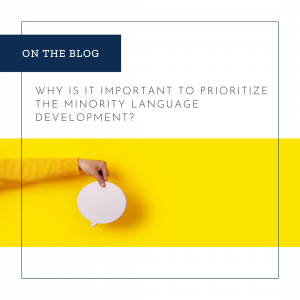
One of the goals of dual language immersion (DLI) education is for students to achieve bilingualism and biliteracy in the minority language. That is, in fact, something that all in the field agree upon. Sounds like a no-brainer, right? But, believe it or not, even with that general consensus from experts in the field, there are a multitude of opinions about the degree of bilingualism and biliteracy a student should attain by graduation. That’s where it gets tricky. It’s also where our emphatic prioritization of minority language development begins.
It likely comes as no surprise that we at addalingua are dual language immersion programming purists. We’re laser-focused on results for students so that they get a return on their investment year over year in the program. This return, we’ve witnessed time and time again with thousands of students, comes at no cost to English language development. “But, how can that be?” you might ask, when we at addalingua advocate for as much time as possible in the minority language throughout the school day.
The truth is that there’s a real need to prioritize minority language development inside DLI programs. It’s imperative to counteract overuse of English which undermines bilingualism and biliteracy goals. In fact, research demonstrates that, for dual language immersion students in the United States, spending more time in the minority language does not adversely affect their English language development. Beginning English instruction in early elementary school and providing more of it throughout the elementary years doesn’t actually result in better outcomes in English for either native speakers of English, or English Language Learners (ELLs). “For example, English-speaking students in early total IMM and ELLs in 90/10 TWI programs achieve the same levels of proficiency in English as students in 50/50 programs even though the latter have more exposure to English in school” (Genesee, 2004; Lindholm-Leary, 2010 as cited in Cloud, Genesee, and Hamayan, 2013, p. 28). We view that as an invitation to shift the power differential inherent in U.S. education which has traditionally penalized learners who enter school speaking languages other than English.
It comes as no surprise that, oftentimes, students prefer English given their perception of its value. Think about U.S. popular culture. So much arrives to students’ worlds in English. From music to movies, books to TV shows, students are, in most cases, immersed in English. They see it as the language of business, school, and they see its inherent value in the community. It’s even the language of the high-stakes tests they’re asked to take throughout their educational experiences. And, you guessed it, those tests are associated with financial reward and opportunity. If we want high levels of bilingualism and biliteracy for students, we’ve got to do some paradigm-flipping.
Don’t get us wrong. We’re NOT saying that English isn’t important. It absolutely is. We’re simply saying that we don’t have to worry about students not learning English because it’s everywhere. Right now, countless data points and research articles have pointed to the fact that English Language Learners currently have the lowest high school graduation rates of all student groups. Clearly, “what we’ve always done,” isn’t working to boost the graduation rates of ELLs. It’s time that we prioriize minority language development so that ELL students’ skills in their first language can continue to flourish while they simultaneously learn English.
Are you interested in the granular details on how to prioritize minority language development for all of the learners in your program? Or, are you leading or teaching in a school that has the goal of boosting the graduation rates of English Language Learners? Or, maybe you’re new to the concept of immersion, but are feeling ready to give it a go! If so, give us a call. We have a a multitide of ideas, practices, and resources that can support you in making the difference you want to make!
Learn more by watching our Language First webinar: link here.


